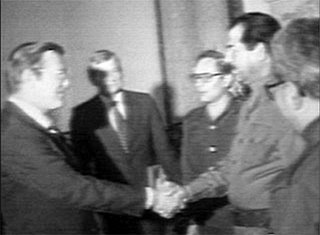How the US armed Saddam - and how Israel tried to
 Sen. Robert Byrd.(D- West Virginia) Senate floor on October 4, 2002.
Sen. Robert Byrd.(D- West Virginia) Senate floor on October 4, 2002.
He speaks of biological weapons in the hands of Saddam Hussein as being something new. That is not new. That is not new.
This Nation itself helped to build, helped to create the building blocks of biological weaponry years ago when we sent to Saddam Hussein, this country made available to Iraq, back in the days when we thought that Saddam Hussein would be our friend. A few years later, after we provided Iraq help in making biological weapons, today we find he is our enemy.
This is the way it is. Yesterday's friend is today's enemy. We have known about the biological weapons for years. We helped Iraq to have the building blocks. Now we have claimed this is something new. This is not new. This is not a new pretext. We have known this all along. The Israelis knew these things. They knew what was happening in Iraq with respect to nuclear weapons. These things are not new, but they are new just before this election. That is what I am saying. Let us come back after the election and then debate, and then, who knows? I might join with the distinguished Senator in promoting a resolution to declare war, Congress declare war.
An interesting article can be found here by Sun Times reporter Robert Novak adds detail to these claims of the aged but sharp tongued Senator.
At a Senate Armed Services hearing the previous week, Byrd tried to disinter the history of the weapons supplied . ''Did the United States help Iraq to acquire the building blocks of biological weapons during the Iran-Iraq war?'' he asked Rumsfeld. ''Certainly not to my knowledge,'' Rumsfeld replied. When Byrd persisted by reading a current Newsweek article reporting these exports, Rumsfeld dismissively (and we know completely untruthfully) said, ''I have never heard anything like what you've read, I have no knowledge of it whatsoever, and I doubt it.''
There is in fact a Senate Banking Committee report dated May 25, 1994. In 1985 (five years after the Iraq-Iran war started) and succeeding years, which reported, ''pathogenic (meaning ''disease producing''), toxigenic (meaning ''poisonous'') and other biological research materials were exported to Iraq, pursuant to application and licensing by the U.S. Department of Commerce.'' It added: ''These exported biological materials were not attenuated or weakened and were capable of reproduction.''
The report details 70 shipments (including anthrax bacillus) from the United States to Iraqi government agencies over three years, concluding, ''It was later learned that these microorganisms exported by the United States were identical to those the United Nations inspectors found and recovered from the Iraqi biological warfare program.''
Such assistance followed on and was a consequence of President George H.W. Bush signing National Security Directive 26 on Oct. 2, 1989. Classified ''secret'' ( recently declassified) it said:
''Normal relations between the United States and Iraq would serve our longer-term interests and promote stability in both the Gulf and the Middle East. The United States government should propose economic and political incentives for Iraq to moderate its behavior and to increase our influence with Iraq.''
It was the Newsweek article (by Christopher Dickey and Evan Thomas) that so interested Byrd and which he quoted from to the Armed Forces Committee reported on Rumsfeld's visit to Baghdad on Dec. 20, 1983, that launched U.S. support for Saddam against Iran. Answering Byrd's questions, Rumsfeld said he did meet with Saddam and Foreign Minister Tariq Aziz, but was dismissive about assisting ''as a private citizen . . . only for a period of months.'' Rumsfeld contended he was then interested in curbing terrorism in Lebanon. Of course.
Howard Teicher a Reagan National Security Council aide who accompanied Rumsfeld to Baghdad,on Jan. 31, 1995. in sworn court testimony said Rumsfeld relayed Israeli Prime Minister Yitzhak Shamir's offer to help Iraq in its war. ''Aziz refused even to accept the Israeli's letter to [Saddam] Hussein offering assistance,'' said Teicher, ''because Aziz told us that he would be executed on the spot.''
Teicher also described a still-secret National Security Decision Directive signed by President Reagan in June 1982 that set forth a U.S. policy of preventing Iraq from losing its war with Iran.
"CIA Director Casey personally spearheaded the effort to ensure that Iraq had sufficient military weapons, ammunition and vehicles to avoid losing the Iran-Iraq war,"Teicher stated.
The Teicher affidavit merited only a brief reference in a "defense & diplomacy" round-up in the Washington Post (2/4/95). The New York Times also published a cursory account of the new information (2/5/95); almost all other major newspapers ignored it. Indeed, among America's major papers and networks, only the Miami Herald gave the trial (of Teledyne execs selling cluster bombs to Cardoen Industries) regular coverage.
His testimony of course supported the New Yorker article (11/2/92) by reporters Murray Waas and Craig Unger, claiming that Vice President George Bush in 1986 urged Saddam Hussein to intensify his air war against Iran--in order to increase Iran's demand for U.S.- made anti-aircraft weapons. Appearing two weeks before the '92 election, the New Yorker article was attacked in the conservative press. On the Wall Street Journal's editorial page (10/28/94), Steven Emerson mocked the article as a "Byzantine conspiracy theory."
See also here Robert Novak, Chicago Sun-Times, 26 Sept 2002
Much play has been made in the press about the gassing at Halabja ... perhaps Saddam should have had some accessories in court with him .. starting with Rumsfeld.

No comments:
Post a Comment